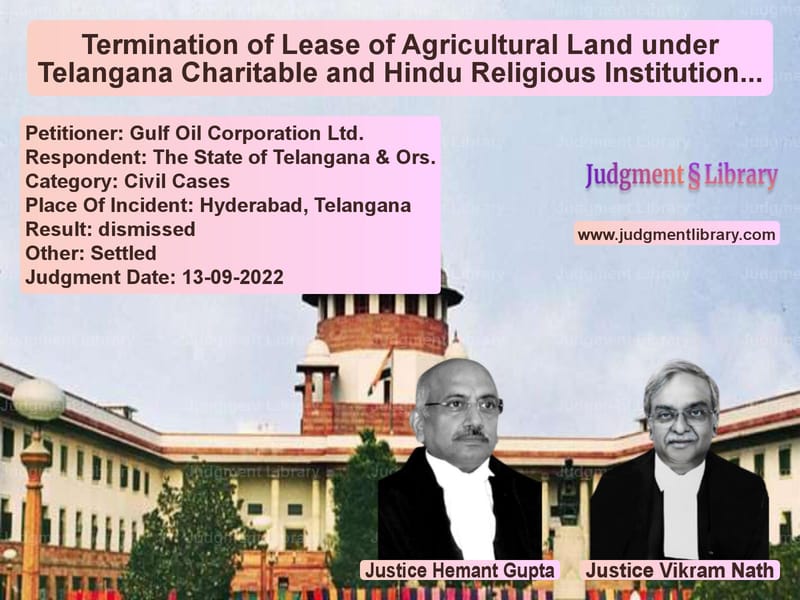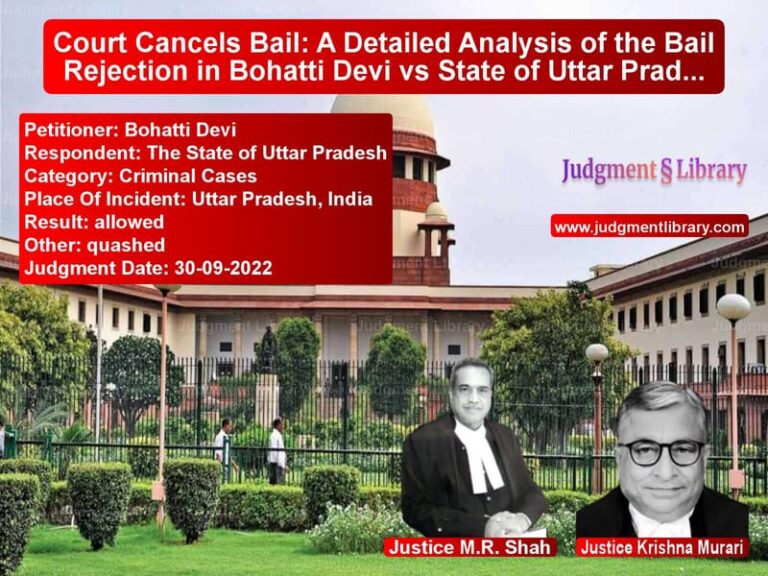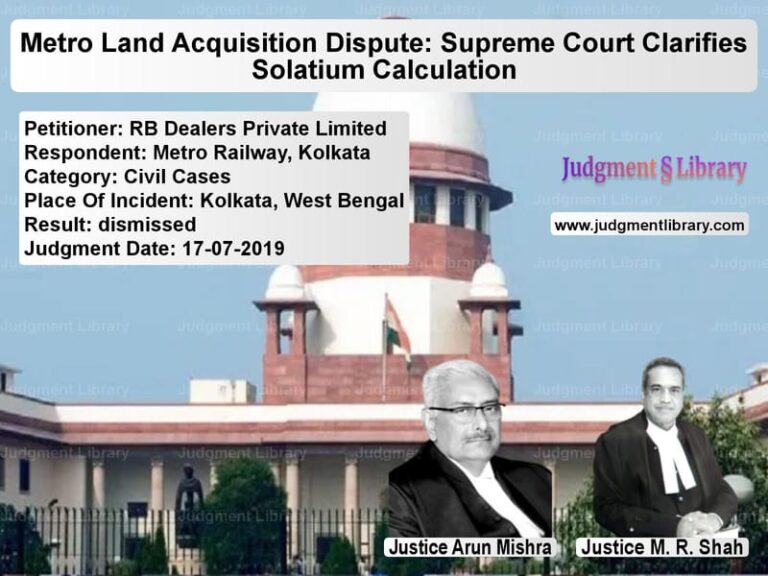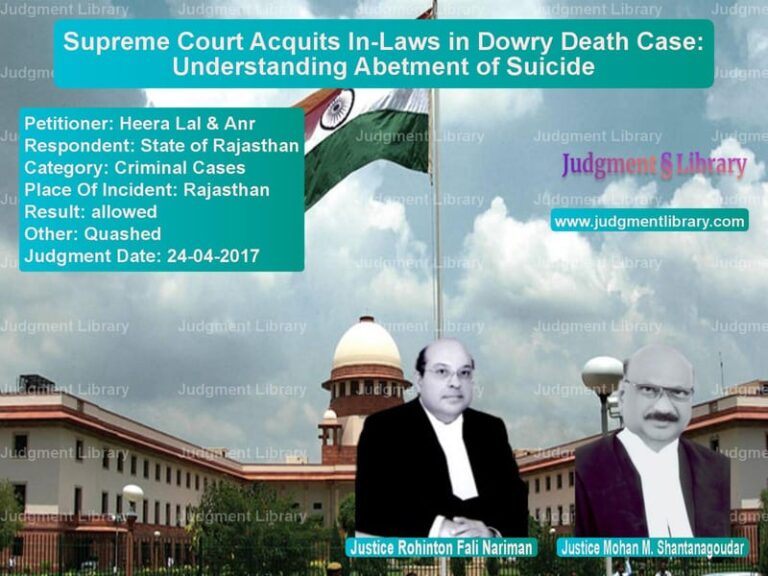Termination of Lease of Agricultural Land under Telangana Charitable and Hindu Religious Institutions Act
The Supreme Court in the case Gulf Oil Corporation Ltd. v. The State of Telangana & Ors. dealt with a dispute regarding the termination of lease agreements for inam lands granted to a religious institution. The appeal involved the legal interpretation of Section 82 of the Telangana Charitable and Hindu Religious Institutions and Endowments Act, 1987, which governs the lease of agricultural lands held by religious institutions. The case also examines the issue of land usage, statutory approvals for leases, and the validity of lease agreements.
Background of the Case
The appellant, Gulf Oil Corporation Ltd., had leased agricultural lands measuring 540 acres in Kukatpally, Hyderabad, from the respondent Sri Udasin Mutt. The lands were originally granted as inam lands by the Nizam of Hyderabad in 1873. The lease was executed in the 1960s and 1970s, with the final agreement signed in 1978. The appellant claims to have continued using the land for industrial purposes, despite the fact that the land was classified as agricultural land under the Inams Abolition Act and subsequently, the 1987 Act.
In 2008, the lessee was informed that the land was no longer considered agricultural and that the lease had been cancelled under the provisions of Section 82(1) of the 1987 Act. The case escalated to the Supreme Court after several legal proceedings, including the Andhra Pradesh High Court’s order for eviction.
Read also: https://judgmentlibrary.com/supreme-court-reduces-compensation-in-medical-negligence-case/
Legal Issues
- Whether the land in question is agricultural land, thereby making it subject to the statutory cancellation of the lease under Section 82(1) of the 1987 Act?
- Was the lease valid under the 1987 Act, despite the lease agreements being executed before the Act’s commencement?
- Does the application of the Inams Abolition Act and subsequent amendments affect the enforceability of the lease?
Arguments by the Appellant (Gulf Oil Corporation Ltd.)
The appellant argued that:
- The land in question was leased for non-agricultural purposes, primarily industrial use, and therefore, Section 82 of the 1987 Act, which applies to agricultural land, should not apply.
- The Mutt’s claim regarding the land’s agricultural status was raised too late, and it had not been included in the original pleadings.
- The lessee had long been in possession of the land, using it for industrial purposes, and any termination based on agricultural classification should not apply.
- The previous order under the Inams Abolition Act, which confirmed the land as non-agricultural, should hold precedence over the current proceedings.
Arguments by the Respondent (Sri Udasin Mutt)
The Mutt contended that:
- The land was granted as inam land for religious purposes, and under the provisions of the Inams Abolition Act, the lease had to be granted with government approval, which was not obtained for the lease deeds from the 1960s and 1970s.
- Section 82 of the 1987 Act mandates the cancellation of leases for agricultural lands held by non-landless persons. Since the land was agricultural, the lease was automatically null and void.
- The land in question, despite being used for industrial purposes, remains agricultural by definition, and thus, the statutory provisions of the 1987 Act should apply to cancel the lease.
Supreme Court’s Observations
The bench, consisting of Justice Hemant Gupta and Justice Vikram Nath, made several key observations in this case:
1. The Nature of the Land
The Court observed that the land was originally agricultural, and while its use may have been converted for non-agricultural purposes, its classification under the 1987 Act did not change. The judgment clarified:
Read also: https://judgmentlibrary.com/supreme-court-enhances-compensation-for-land-acquisition-in-haryana/
“The test for applicability of Section 82(1) is whether the land is agricultural, not the purpose for which it is being used. Therefore, even if the land is used for non-agricultural purposes, the lease is still subject to cancellation under Section 82 if it is agricultural land.”
2. Statutory Cancellation of Lease
The Court upheld the cancellation of the lease, pointing out that the 1987 Act explicitly provides for the cancellation of leases for agricultural land, irrespective of its use. The lessees had failed to prove that the land was non-agricultural at the time of the lease’s termination:
“Section 82(1) of the Act applies to all leases of agricultural land, whether or not they are used for agricultural purposes. The statutory cancellation of the lease stands, and the lessee’s argument based on the use of the land for industrial purposes does not hold.”
3. Effect of Prior Approvals and Documentation
The Court also considered the impact of prior government approvals on the validity of the lease. While there was some confusion surrounding the approvals, the lack of documentation confirming government sanction for the lease deeds from 1964 to 1978 led to the conclusion that the lease was invalid:
“The lease deeds executed before the commencement of the 1987 Act did not obtain the necessary government approval, which is required under Section 75 of the Act. Therefore, these leases are void.”
Final Judgment
The Supreme Court dismissed Civil Appeals Nos. 7759-7760, affirming the High Court’s decision for eviction. However, it allowed Civil Appeal No. 7761, which dealt with the lessee’s request for reconsideration of the lease under the 2003 Rules for non-agricultural land:
- The Court held that the lease deeds, being agricultural, were statutorily cancelled under Section 82(1) of the 1987 Act.
- The Court ruled that the 2003 Rules for non-agricultural land did not apply to the agricultural land in question.
- The appeal regarding reconsideration of the lessee’s request under Rule 15 was dismissed as untenable.
Key Takeaways from the Judgment
1. The Importance of Land Classification
This ruling emphasizes that the classification of land as agricultural or non-agricultural is central to the application of Section 82 of the 1987 Act. The use of the land is irrelevant when determining the applicability of statutory cancellation of leases.
2. Government Approval for Leases is Critical
The case reiterates the necessity of obtaining prior government approval for leases exceeding six years. Without such approval, the lease is void under the relevant provisions of the Act.
3. Statutory Cancellation of Lease
The ruling affirms that statutory provisions can cancel leases even if they were granted under previous laws, provided the land remains agricultural and the lease is not in compliance with current legal requirements.
Conclusion
The Supreme Court’s decision in this case clarifies the scope of Section 82 of the Telangana Charitable and Hindu Religious Institutions and Endowments Act, 1987, particularly regarding agricultural land. By reinforcing the importance of land classification and the need for prior government approval, the ruling sets a clear precedent for future cases involving land leases to religious institutions.
Petitioner Name: Gulf Oil Corporation Ltd..Respondent Name: The State of Telangana & Ors..Judgment By: Justice Hemant Gupta, Justice Vikram Nath.Place Of Incident: Hyderabad, Telangana.Judgment Date: 13-09-2022.
Don’t miss out on the full details! Download the complete judgment in PDF format below and gain valuable insights instantly!
Download Judgment: gulf-oil-corporation-vs-the-state-of-telanga-supreme-court-of-india-judgment-dated-13-09-2022.pdf
Directly Download Judgment: Directly download this Judgment
See all petitions in Contract Disputes
See all petitions in Property Disputes
See all petitions in Succession and Wills
See all petitions in Judgment by Hemant Gupta
See all petitions in Judgment by Vikram Nath
See all petitions in dismissed
See all petitions in settled
See all petitions in supreme court of India judgments September 2022
See all petitions in 2022 judgments
See all posts in Civil Cases Category
See all allowed petitions in Civil Cases Category
See all Dismissed petitions in Civil Cases Category
See all partially allowed petitions in Civil Cases Category







